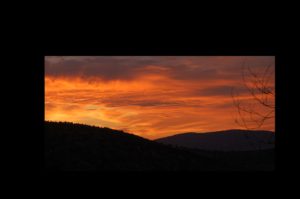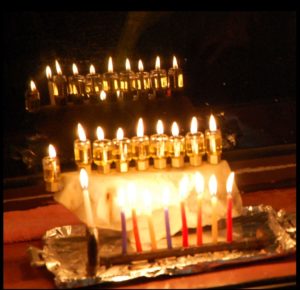
Art Therapy
“One of the basic rules of the universe is that nothing is perfect. Perfection simply doesn’t exist…..Without imperfection, neither you nor I would exist” ― Stephen Hawking



 We have just passed the shortest day of the year, and although the day is a bit longer now, darkness falls fast. It seems that the natural rhythm of darkness and light is much more noticeable these days, as our world is plunged into the darkness of a pandemic which touches all corners of the world and spreads a deep feeling of gloom over everything. We need to honor the mournful feelings, to stay with them a bit. To remember our dead, to feel the pain of loss in order to muster the courage to fight back, to realize our purpose of being in this world. I was born during a dark period in Europe during World War II. In fact, I arrived with a big noise and misery on the Pacific side of the world, exactly at the time of the attack on Pearl Harbor. I was brought home from the hospital in time to light the first Hanukah candle nestled in my mother’s arms, with my father and brother. Throughout my life I have carried with me the trauma and the light, and learned to accept both in an internal balance.
We have just passed the shortest day of the year, and although the day is a bit longer now, darkness falls fast. It seems that the natural rhythm of darkness and light is much more noticeable these days, as our world is plunged into the darkness of a pandemic which touches all corners of the world and spreads a deep feeling of gloom over everything. We need to honor the mournful feelings, to stay with them a bit. To remember our dead, to feel the pain of loss in order to muster the courage to fight back, to realize our purpose of being in this world. I was born during a dark period in Europe during World War II. In fact, I arrived with a big noise and misery on the Pacific side of the world, exactly at the time of the attack on Pearl Harbor. I was brought home from the hospital in time to light the first Hanukah candle nestled in my mother’s arms, with my father and brother. Throughout my life I have carried with me the trauma and the light, and learned to accept both in an internal balance.
Every society and culture from time immemorial has looked darkness in the eye, and developed rituals to conquer the black shadows. Light, in the form of fire, is involved in all of the ancient rituals. Torches, candles, or bonfires lifted the feeling of heaviness and gloom. People danced, chanted, and sometimes went into ecstasy, feeling as if the forces of light conquered the forces of evil. And so it is today. We are approaching the traditional holidays commemorating ancient events, and bringing light into our homes and public places. Fighting the darkness by spreading the light.
In my Jewish tradition we are now celebrating the holiday of Hanukkah. The candles are lit for 8 days. The candelabra, hanukkiah, is placed so that the candles can be seen from the outside, illuminating both inside and out, to proclaim the miracle. Each day a new candle is added, so that by the 8th day all of the candles are burning brightly. Slowly they penetrate the darkness, a bit at a time, as though to say you can not chase away darkness all at once. Bringing light into the world is a process that cannot be done alone. You have to gather more and more participants to complete the task. Someone has to start, but who? There actually is an extra candle. This is the one that lights all the others. It is called a Shamash, a deputy or assistant. I think this is the most important one. The one who provides the spark. The one who ignites all the others, and spreads the light.
 I am fortunate to be participating in a 6-month global experiment, together with 900 people divided into 25 pods. Each group is dealing with a different collective trauma. I am in the group dealing with the collective trauma of war. The inspiration and leadership comes from a special person – a deep thinker and activist, Thomas Hübel, a contemporary spiritual teacher. Through his inspiration and his spark that ignites others, millions are connecting in order to heal collective trauma in the world. The light and healing are facilitated through online gatherings around the world with thousands participating in building resilience and moving toward collective healing. His new book “Healing Collective Trauma: A Process for Integrating Our Intergenerational and Cultural Wounds” is an important document to study and internalize. Quoting from the book: “Our life’s most inspirational conversations and healing interactions share some quality of deep presence, which makes it possible for subtle light to flow within and between us.”
I am fortunate to be participating in a 6-month global experiment, together with 900 people divided into 25 pods. Each group is dealing with a different collective trauma. I am in the group dealing with the collective trauma of war. The inspiration and leadership comes from a special person – a deep thinker and activist, Thomas Hübel, a contemporary spiritual teacher. Through his inspiration and his spark that ignites others, millions are connecting in order to heal collective trauma in the world. The light and healing are facilitated through online gatherings around the world with thousands participating in building resilience and moving toward collective healing. His new book “Healing Collective Trauma: A Process for Integrating Our Intergenerational and Cultural Wounds” is an important document to study and internalize. Quoting from the book: “Our life’s most inspirational conversations and healing interactions share some quality of deep presence, which makes it possible for subtle light to flow within and between us.”
Just as in the Jewish tradition, so too in the Christian, light plays a major role. The Christmas tree, decorated and decked out with candles, or nowadays electric bulbs, spreads light and chases away darkness and animosity. It is a symbol of peace and joy. A story is told in our family about my sister who was 8 at the time, visiting the home of my mother’s uncle, who had a Christmas tree all decorated with burning candles. She was delighted, and exclaimed “Look how beautifully the Hanukkah candles burn on the Christmas tree!” The adults were embarrassed. It takes a child to show us the importance of light in all traditions. We all fight darkness in our own unique way, but when we combine our individual lights with each other, we can truly chase away the traumas of dark hatred, prejudice, and wars. May there be light.

Happy Holidays.